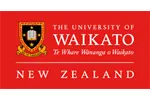We're moving! This site will be relocating to goingto.university in 2026. Please update your bookmarks to the new address.


| The award | How you will study | Study duration | Course start | Domestic course fees | International course fees |
|---|---|---|---|---|---|
| DMA | - | 3 years | February, July | NZD 5900 per year | NZD 35175 per year |
If you're passionate about musical performance - the Doctor of Musical Arts (DMA) is the doctoral degree for you. If your interests relating to music are more in the areas of composition, research-based musicology, multimedia work, music technology or electroacoustic music, then consider enrolling in the Doctor of Philosophy (PhD) instead.
While working towards your DMA at Waikato, you'll spend half your time doing performances based on your research, and the other half putting your written thesis together. You'll perform every week, and during these performances you'll demonstrate to your supervisor what you've learned from your research. At Waikato, your DMA supervisors are leading musicians and you'll be able to use a state-of-the art performing arts venue for your practical lessons.
The Waikato DMA sets you up with the skills you'll need to turn your passion for musical performance into a career, whether that be as a solo artist, a chamber or orchestral musician, an accompanist, recording artist or repetiteur. You might prefer to use the skills you've learned in a different way, and work in either radio or print music journalism. You might also want to share what you have learned during your DMA and take on a teaching role, either as a performer-academic working in the tertiary area or as an instrument or vocal teacher.
You'll be able to choose a research topic that interests you. Topics previously chosen by students completing a DMA include those focusing on particular composers (such as New Zealand cellist and composer Arnold Trowell and New Zealand composer John Ritchie); a particular aspect of musical composition in performance (such as J.S. Bach's use of the variation form in treating Lutheran chorales); musical education (such as the application of ICT in the music classroom: Tools and trends in the New Zealand secondary classroom from 2007-2009); specific cultural music traditions (such as Kīngitanga and Music: An examination of repertoire and composition of Māori waiata and puoro relating to the Kīngitanga (King Movement) from 1912 to 2008); and using technology in music (such as a mouse driven interface for virtual stringed instrument controller).
Contact University of Waikato to find course entry requirements.
Below are some suggested courses at other providers that you may also be interested in:
Advanced Sound Design – Short Course Summer School
Catalyst - Institute for Creative Arts and Technology
Find out moreMultimedia & Creative Technologies Professional Bachelor Degree
KdG University of Applied Sciences and Arts
Find out moreIf you do not meet the entry requirements for this course then consider one of these courses from another institution:
There are 603 other courses listed from University of Waikato. A selection of these are displayed below:
Bachelor of Arts, Main Subject in Teaching (Mātauranga Māori/Māori Medium) BA
University of Waikato
Find out moreBachelor of Arts, Major in International Languages and Cultures BA
University of Waikato
Find out moreJoin the StudyLink email list and never miss a chance to turn your study abroad dreams into reality!
